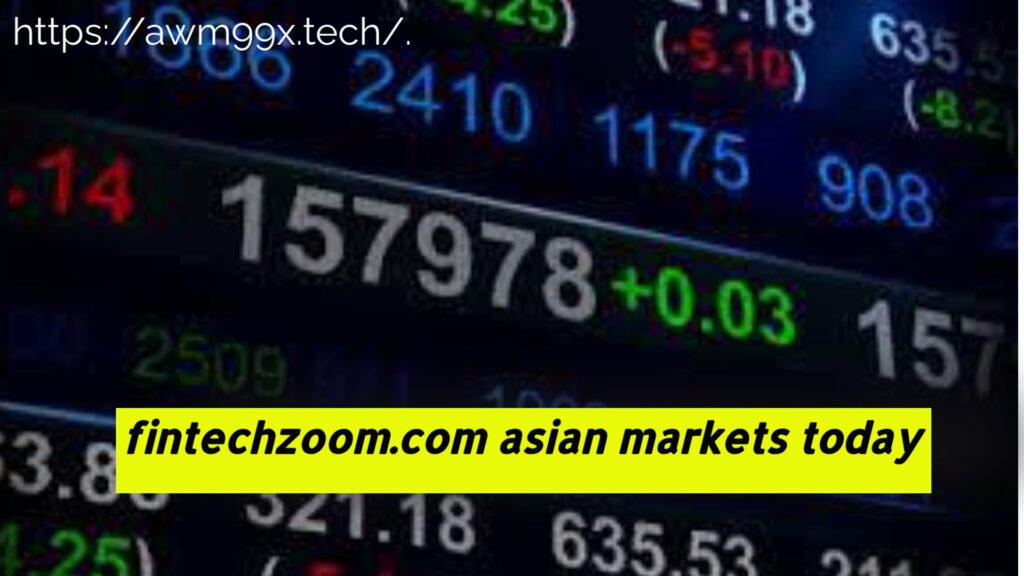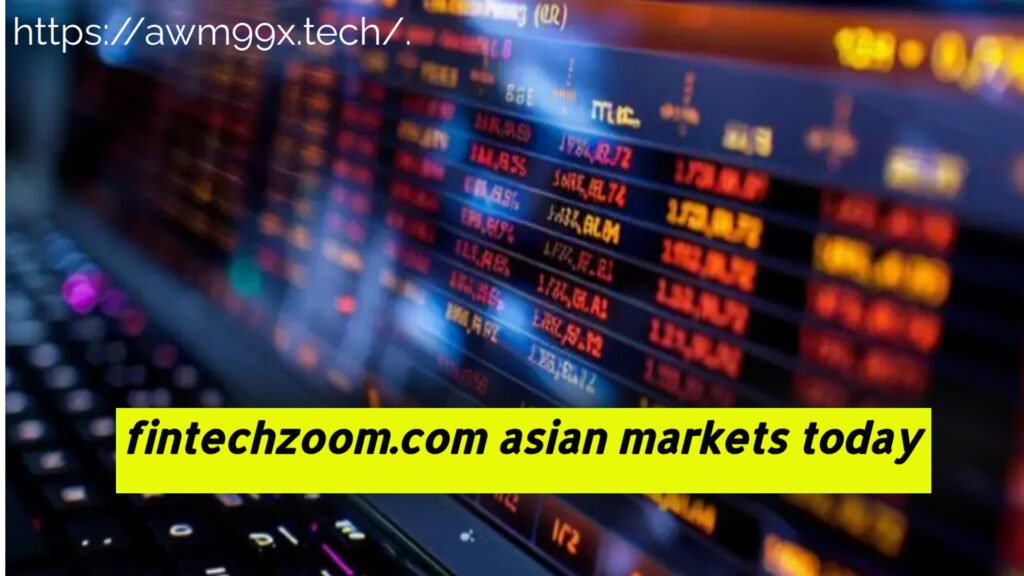
The Importance of the Asian Markets for the Global Economy
The Asian region has many opportunities to offer. It is a developing region that has major financial centers in Tokyo, Hong Kong, and Shanghai that shape global market trends. It acts as an economic thermometer that spurs or dampens investment and technological development as well as currency changes all over the world. Consumers can keep track of these dynamic markets on fintechzoom.com asian markets today.
Events and changes are very important because we are still experiencing economic turbulence. Investors and analysts should not forget to monitor the Asian markets whenever they make such intricate financial decisions. Its posts like these could be pivotal towards an investor’s outlook and moves in such rapid globalized markets.
Market Overview
The Asia’s financial markets display variety and growth. The key markets of Japan, China, South Korea and Hong Kong can be assessed using major indices.
Nikkei 225 (Japan): Japan’s Nikkei 225 is associated with technology and manufacturing, populated by established and innovative companies.
Shanghai Composite (China): Given that the Shanghai Composite grew out of China’s economy, it has more recently been impacted by manufacturing and exporting.
Hong Kong H-Shares Index (Hang Seng): While this index contains a lot of financial and tech stocks, it often reflects the direction of the Chinese government.
Recently the IT, finance and green energy sectors have done quite well in these markets. Similarly, Japan’s low interest rates or China’s new tech regulations shaped the future of these indices.
Economic Indicators
There are several economic indicators in the Asia-Pacific market which are essential in comprehending the larger picture. These comprise the following:
Inflation Rates: The shifts in the inflation target tend to influence consumer expenditure and business investment in those areas.
GDP Growth: Considering that economies such as China, Japan, and India are growing at different paces, GDP presents a crucial element for investors.
Currency Exchange Rates: A country’s exchange rate changes, particularly in relation to the US dollar, influence the Asian regions that are export-oriented.
Other trends would include economic fluctuations in interest rates, policies made by the central bank and even pressure from other global economies which would affect the capital inflow in the Asia-Pacific markets.
Investment Trends
Asia, especially backend markets, is noticeably moving towards tech-centric investments: investment in mobile payments and finance industries:
Tech Giants: With big players such as Alibaba and Samsung, technology is the most sought-after area for investment.
Green Bonds: Environmental bonds have greatly been taken into account by investors as they now venture into sustainable industries.
Fintech Investments: Sites like FintechZoom and robo-investors help small investors to take part in the market easily. These people are looking for opportunities in Asia’s fast-growing economy.
Role of fintechzoom.com asian markets today
Fintech is among the dominant forces changing the Asian finance ecosystem in a big way:
Digital Payments: The dominant digital platforms of WeChat Pay and Alipay are making great strides towards a cashless economy.
Blockchain and Crypto: Asia is emerging a the most important center for the development of blockchain and its application as well as the usage of crypto in its diverse forms and shapes across different countries.
Investment Platforms: Platforms like FintechZoom and others are useful to retail investors looking to be relevant and active with Asian stock markets.
This fintech revolution shifts the paradigm of conventional finance towards the new era by enabling wider market participation and providing sophisticated investment tools to all categories of investors.

Key Players and Corporations
A look at the Asian markets and one would notice that there are some of the largest corporations in the world:
Tech Giants: It is the likes of Tencent, Sony and Samsung that dominate the tech space.
Finance Leaders: The scale of Asian financial institutions, such as, Japanese Mitsubishi UFJ or Chinese ICBC is substantially noticeable in the market.
Manufacturing and Energy: Global players such as Toyota and BYD are a manifestation of the site’s huge manufacturing or green energy industries.
These industries are responsible for the development of the Asian financial sector and its investment potential by their innovative approaches
| Market Index | Key Players | Industry | Market Influence |
|---|---|---|---|
| Nikkei 225 (Japan) | Toyota, Sony, SoftBank | Automotive, Technology | Significant in tech advancements and auto manufacturing |
| Shanghai Composite (China) | Alibaba, Tencent, China Petroleum | E-commerce, Technology, Energy | Reflects China’s economic growth and global trade impact |
| Hang Seng Index (Hong Kong) | HSBC, Tencent, AIA Group | Banking, Technology, Insurance | Influential in financial trends and investor sentiment |
| Nifty 50 (India) | Reliance Industries, HDFC Bank, Tata Consultancy Services | Energy, Banking, IT | Attracts international investment and reflects India’s growth |
| KOSPI (South Korea) | Samsung Electronics, Hyundai, SK Hynix | Electronics, Automotive | Important for tech trends and manufacturing output |
| ASX 200 (Australia) | BHP Group, Commonwealth Bank, CSL Limited | Mining, Banking, Healthcare | Key player in commodities and global market influence |
Impact of Global Events on Asian Markets
In fact, Asian markets are influenced by global events:
U.S.-China Relations: Tensions and trade relations impact on stock markets or supply chains, including Chinese stocks and various areas of Asia.
Regional Conflicts: Political confrontations have the definite potential of bringing about volatility to certain specific areas, for example energy and manufacturing.
Pandemics and Natural Disasters: Corona Virus for example, was able to illustrate that disasters of this sort are able to impact the equilibrium of the financial systems within countries.
These external factors affect the market sentiment for Asia and therefore also bring about the risk as well as the opportunity for the investors.
Currency Markets and Asian Forex
The currency trends can be said to be an integral feature of the Asian market:
Key Currencies: Japanese Yen, Chinese Yuan, South Korean won are regarded as the currencies in great significance in the forex markets.
U.S. Dollar Impact: For instance, a well performing dollar has its consequences on Asian exports, impacting the local currencies
Exchange Rate Volatility: Currency movements can have an effect on the market or the returns from an investment.
In order to understand Japan’s and China’s investment strategies in export-oriented industries, it is important to comprehend foreign exchange trends.
Asian Markets and Cryptocurrency
Eastern parts of the world, especially Asia, are warming up to cryptocurrency:
Blockchain Growth: Countries such as Japan, and South Korea are excelling in blockchain innovation and its adoption.
Crypto Regulations: There seem to breach boundaries as some countries go forward embracing crypto while others sit on the fence.
Crypto market Impact: FintechZoom documents these trends and many more with regards to the influence of crypto trends on the financial markets and investment sentiment in Asia.
The changing world of crypto regulations is without risks, but this uncertainty cuts both ways creating opportunities for investors, this is one area to monitor closely.

Economic Policies in Asia
In Asia, economic policy is an important determinant of market trends:
Policy Reforms: Countries like Japan, China, and India have pursued policy reforms to enhance economic resilience.
Trade Agreements: Partnerships and trade agreements define the import and export dynamics.
Growth Initiatives: Tech and green finance, through government-backed initiatives, and other still promote growth.
These policies create supporting frameworks for the region, enhance economic growth in Asia, and in turn create opportunities and invite foreign investors.
Market Forecast and Future Outlook
Going forward, analysts predict gradual growth for the financial markets in Asia:
Expert insights: In the views of the analysts, technology and green finance are the sectors of the future.
Impact of Fintech: the global trend is expected to enhance market reach through increased adoption of fintech.
Long term trends: The focus on Asia in financing sustainable projects is expected to intensify in the future.
Following FintechZoom for news is beneficial for the stakeholders who wish to seize the future chances in the Asian region as well.
Risk Factors in Asian Markets
Some potential risk factors envisage the following,
Currency Fluctuations: These risks refer to when changes in local currency redefine the returns to be made from an investment.
Political Unrest: This will affect the areas where foreign investments are pursued as other regional issues can prevent the economic stability of an area.
Regulatory Risks: Changes in regulation can create new opportunities and alter the landscape of markets making them more favorable to an investable risk.
Risk management strategies are necessary to investors who are inclined in the Asia market.
Investment Strategies for Asian Markets
When making investments in Asia, bear in mind the following strategies
Sector Diversification: Do not concentrate investment in a few areas alone, instead go for technology, finance, manufacturing and such others.
Short Term Vs. Long Term: Short term approach to trading should be adopted on sectors that tend to be volatile while long term investment should follow on sectors that have growth patterns.
Update yourself: Regularly visit the clock management tool such as FintechZoom and other sources for information on what has occurred in the market and the state of the economy.
Asian markets make investment both a difficult and a growing venture which necessitates knowledgeable investing.
asian markets vs european markets
Markets of asian
Financial markets in Asia have their own unique characteristics, which contain both relatively advanced frameworks in countries such as Japan and South Korea, as well as developing nations such as India and Vietnam. Some of the major stock indices are the Nikkei 225, Shanghai Composite, and Hang Seng Index. These markets, however, tend to be more volatile due to geopolitical factors, changes in domestic policies and economic development changes.
European Markets
On the other hand, European markets are regulated in a more centralized manner, being under the influence of the European Union. Key indices include FTSE 100 (UK), DAX (Germany) and CAC 40 (France). European markets tend to be less volatile and are generally deemed more stable but may have comparatively lower rates of growth attributed to an increase in the median age of their population relative to other continents with low birth rates and economic adjustments.
Growth and Performance
Economic Growth in Asia
There is a sustained trend of economic growth in Asia which has been most prominently spearheaded by China and India. There was a gradual economic slowdown in the recent years, however, Asia continues to attract the attention of investors with a lot of focus on infrastructure due to its growing middle class and rapid urbanization. Such growth is primarily attributed to enhanced technology adoption and a youthful population.
Economic Growth in Europe
The European market is not without it’s challenges even though it is stable with low inflation and GDP growth from covid economic recovery. Country specific structural challenges continue to inhibit some economies and the outbreak of covid further entrenched issues that the continent was already facing, with the problem of the population nearing retirement age posing the biggest difficulty in guaranteeing future economic productivity.
Investment Trends
Technological Adoption in Asia
Asia takes the lead in fintech and digital advancement with China and India being the top countries in tech investments. The rise of e commerce, mobile payment systems as well as the technology start-ups forms a new investment shift which sows both local and foreign capital.
Sustainable Investments in Europe
Sustainable finance is actually well from the European markets with high emphasis on environmental, social and corporate governance (ESG). There are existing strict regulations and initiatives in the European Union regarding green energy and sustainable investment practices which the region sets for others as a standard.
Economic Challenges
Geopolitical Risks in Asia
Geopolitical risks particularly the regional expansion of China togethwer with its trade tethering with the US can drastically increase the volatolity of the Asian market. Global events including the trade wars and territorial disputes may also result in quick market changes that create uncertainties for investors.
Regulatory Environment in Europe
The European markets are exposed to risks associated with political instability and in particular Brexit and the differences in economic policies of the EU member countries. This factors can dampen investors confidence and market performance thus making investors more cautious.
Conclusion
It is of the utmost importance for investors to remain in touch with the trends and changes as far as the Asian market is concerned. The impact of fintech and technology in these markets is continually evolving, and FintechZoom is a platform that is effective in providing the necessary updates. Asia’s vast financial market has a lot of growth opportunities coupled with considerable risks, investors will have to be on the look out.
faq
Which Asian stock markets should be the point of focus today?
Common Hints: Asian Markets. Last but not least, investors should also pay attention to key Asian markets like the Tokyo Stock Exchange, Hong Kong Stock Exchange, and Shanghai Stock Exchange. These markets in question are said to be the barometer of the overall economic performance and the investors’ confidence in the region. Go to : Asian markets today at fintechzoom.com.
What is the impact of geopolitical tensions on Asian markets?
Geopolitical risks or events certainly aggravate the situation for investors in Asian markets. Such things like tariffs or military action usually result in higher volatility, which in turn influences the overall performance of stock prices in the region. Go to : Asian markets today at fintechzoom.com.
Which sectors are reporting good earnings in the Asian markets currently?
In Asia, the markets have been thriving recently, with technology, finance, and healthcare sectors being the strongest performers of them all. As noted in fintechzoom.com Asian markets today, large trends point towards a growing interest in fintech companies, particularly in China and India.
What is the impact of currency fluctuation on the Asian stock markets?
One of the region’s biggest concerns remains currency volatility. A strengthened currency may negatively impact international competitiveness, as it creates higher local prices for exported goods. For further details on the trends today, check : Asian markets today at fintechzoom.com.
What are the effects of economic data releases on Asian markets?
Economic data releases, such as the outcomes of GDP growth rates and employment rates, have an impact on the decisions made by investors and the total performance of the market. The data released if it is positive boosts confidence as well as performance in the market. On the lookout for data releases highlighted on fintechzoom.com. asian markets today
Who are the big players in Asian stock indices?
Players such as the big companies that are quoted on the different stock market exchanges or the stock market indices such as Nikkei 225 index and hang Seng index for instance. For example, meaning companies such as, Alibaba, Samsung and toyoata have some influence towards the growth of that market. For more insight, check out the analysis on fintechzoom.com asian markets today.
How do investors lessen risks and exposure while investing in Asian markets?
ETFs or mutual funds focused on Asian markets can be used by investors to help diversify their portfolios. This method of investment can help mitigate risks by diversifying across many companies and industries. See suggestions for investment strategies on fintechzoom.com asiankanet workstoday.
Why are foreign investments important for Asian markets?
Foreign investments, for instance in the construction field are very essential for the development and sustenance of the markets in Asia. They help to provide funds to be used by the local businesses as well as adding to the liquidity of the market. The foreign investment levels always come out during financial and economic updates over the weeks on fintechzoom.com led by asian markets today.
What methods can I employ to remain informed about the trends in the Asian market?
In order to stay informed, investors can pay attention to the Asia market news from websites, enlist as subscribers to newsletter resources providing information about market analysis or they can utilize fintechzoom.com for today’s insights about Asian markets.
What kinds of trading strategies do you usually adopt when dealing with the Asian markets?
Day trading, swing trading and long-term investing are some of the common trading strategies. They all have their unique risks and rewards and the investor has to pick one that suits his risk tolerance and investment objectives. Seek solutions on a wider range of strategies on fintechzoom.com asian markets today.










